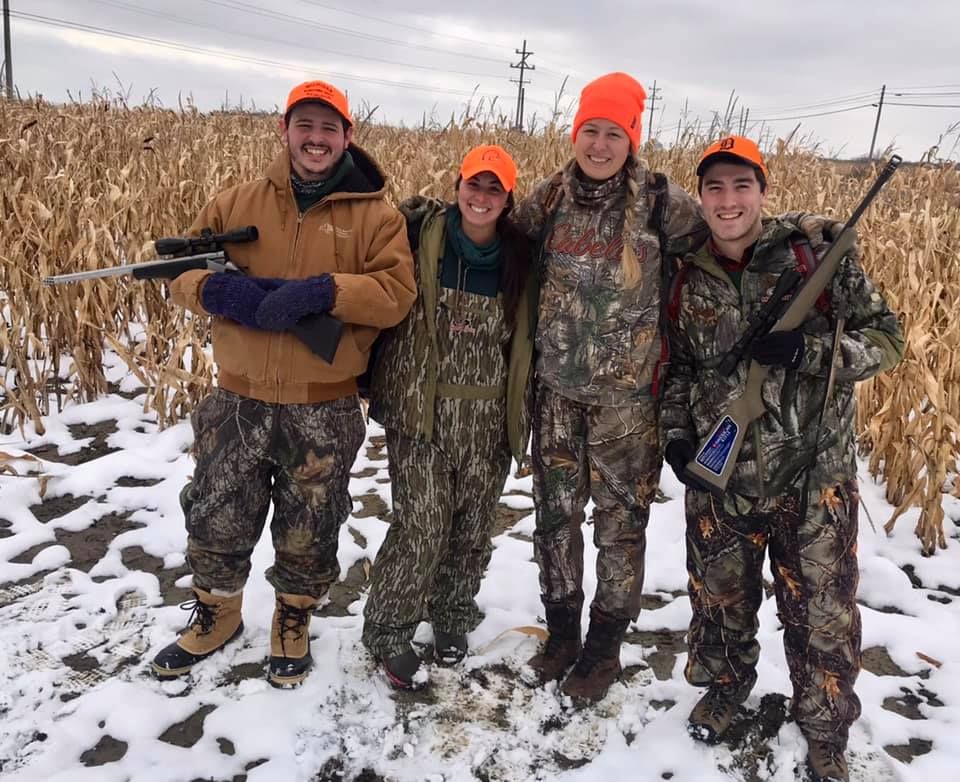MUCC Staff Take on Deer Hunting, Together
The weekend many outdoorsmen and women have waited for has come and gone – the opener of Michigan’s firearm season. There is still plenty of time left to hit the field but there’s something special about the tradition of November 15.
Most years this tradition is shared with my husband and family. There is a dinner on Deer Season Eve (yes, it’s an official thing) where drinks, stories and laughs are shared. Anticipation is high as everyone wonders what might be seen come shooting hours.

Pictured left to right: Max Bass (Camp Director), Morgan Jennings (Wildlife Cooperatives Coordinator), Autumn Christenson (Americorps Member) and Ian Fitzgerald (Policy Assistant).
This year was a little different for me. I had the privilege of hosting two friends and coworkers from MUCC on their first deer hunts. On Friday evening, Ian Fitzgerald (MUCC Policy Assistant) and Max Bass (Youth Camp Director) joined me and my husband in Shiawassee County at our main hunting property.
It was very obvious that the rut is still in full force as we watched bucks chasing close behind does with no chance of stopping them. We also had the opportunity to watch button bucks, doe fawns, yearling bucks fighting, a nursing fawn, a more mature 2.5-year-old buck checking scrapes, turkeys and a diverse group of songbirds that flitted around the blind each day. We spent 23 hours in the blind over three days.
Ian and Max experienced the highs and lows of deer hunting from a few hours without seeing nothing more than a squirrel to the quick appearance of a deer with limited time to judge the situation. One moment that stood out to me was our discussion on how different it is to have crosshairs on a big game animal than a flash of waterfowl at the end of a shotgun barrel. Some call deer hunting boring in comparison; some find the pace peaceful. I think having both experiences is important and being able to process them is a significant part of who you are as a hunter.
I can’t speak for all but, personally, waiting for a deer to present you with an ethical shot can be hard to watch through a scope. For a minute you are right with the animal. You are watching its behavior and thought as it moves through the motions of survival. This emotion is something that can’t fully be described and will only be felt when you align your sight on a shoulder. It is no more connected than any other game species but it is a different emotional experience.
That moment tests the ability of a hunter to gain control of his or her emotions and what we are going to call ‘deer fever.’ The shakes will get you no matter what kind of deer is standing in front of you. Ian and Max were impressive behind the scope, both taking their time and considering shot placement, timing and reading the body language of deer. This time, we weren’t successful in harvesting a deer but at no fault of their own.
MUCC staff (all 12 of us) practice what we preach. Our jobs require us to understand wildlife, habitat, policy, education, communication and people. We know that to do all of those things well, we must immerse ourselves in the outdoor world. Some came into this industry with vast experience and some with very little in certain areas. This is what we all have in common – we are willing to teach each other and learn from each other. Sharing the field means a little bit more because of those things. I learned more this weekend with two new deer hunters by my side last weekend than all of my 2019 hunting experiences combined. I can’t wait to have them out again and this time send them home with meat for the freezer.
The post MUCC Staff Take on Deer Hunting, Together appeared first on Michigan United Conservation Clubs.
Recent Posts



